Professor
Denis Hall (Director HW-IMRC) FInstP, FOSA, FIEEE, FEPS,
FRSE
Photonics-based Manufacturing Theme
D.R.Hall@hw.ac.uk
Area of Research
- Solid state laser technology, power diode optics,
Laser micro-processing, micro-optics & ceramic
optics fabrication.
Professor Denis R Hall received his BSc (Hons)
in Physics Manchester University, MPhil for research
in cell biology (London University), PhD in Electrical
Engineering (Case Western Reserve University,
USA), and MBA from the Edinburgh Business School.
He won a National Academy of Sciences Research
Fellowship at NASA Goddard Space Flight Center
for research on space-based optical communication,
and then worked on e-beam modelocked lasers at
Avco Everett Research Laboratory in Boston, and
on lasers and IR systems at RSRE, UK before transferring
to Hull University, from where he led the UK Satellite
Laser Ranging project at Royal Greenwich Observatory.
Parallel, research on RF discharge laser excitation
led to new technologies for CO2 high power lasers.
Since 1987, he has been Professor of Photonics
at Heriot-Watt University, Edinburgh, conducting
research on laser device physics and applications.
His group pioneered ultracompact high power
planar waveguide lasers, exploiting concurrent
research in RF discharge physics and optical
waveguides to develop new laser concepts based
on 2-D laser power scaling and novel laser resonators.
Planar waveguide CO2 lasers are now successful
industrial products for several global companies.
Current research concentrates on high power
planar solid state lasers, high power diode
laser optics and laser fabrication of micro-optics,.
This work, part of a general industrial orientation
involving partnership in many industry/university
collaborative research projects, has produced
a series of commercial laser products and industrial
laser-based systems. He has co-founded three
successful start-up companies producing lasers
and photonic systems.
He is a Fellow of the Royal Society of Edinburgh,
the IEEE, the European Physical Society, the
UK Institute of Physics, the IEE, and the Optical
Society of America. He was UK IoP Quantum Electronics
Group Chairman (1990-93), and EPS QEOD Chairman
(1998-2000). From 1998-2007 he was Deputy Principal
(Research and Knowledge Transfer) at HWU. He
is a member of the CSIR Board (S Africa) and
of the Advisory Board of the S African National
Laser Centre. He is Director of the James Watt
Institute for High Value Manufacturing –
incorporating the IMRC at Heriot Watt University.
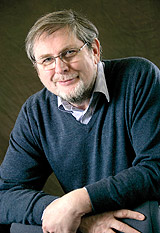 |
Professor
Howard Baker FInstP
Photonics-based Manufacturing Theme
H.J.Baker@hw.ac.uk
Area of Research
- Industrial applications of laser diodes.
Professor Baker received his B.Sc.in Physics
and Ph.D. in Laser Physics from Manchester University,
in 1968 and 1973, respectively. Postdoctoral
research at Manchester was on pulsed iodine
photo-dissociation lasers. In 1980, he became
a Lecturer in Applied Physics at Hull University,
with research on mercury halide and TEA CO2
lasers and magnetic switching circuits for electrical
pulse generation. In 1987, he became Senior
Lecturer in Physics at Heriot-Watt University
in support of a new BSc Optoelectronics and
Laser Engineering degree course, allowing research
specialisation in both laser physics and laser
engineering. In the 1990s, he played a leading
role in the development of scalable lasers with
RF discharge excitation, and CO2 planar waveguide
and array lasers were pioneered. The work aided
the establishment of a currently successful
laser manufacturer in the UK. This expertise
in the new CO2 laser technology led to applications
research on laser drilling of circuit boards,
machining of unfired LTCC ceramic laminations
and precision micro-machining and polishing
of silica optics.
Starting in 1995, his main laser technology
interest has been in high power diode lasers,
used directly or as pump units for solid-state
lasers. A novel diode pumping scheme led to
world-leading performance from planar waveguide
solid-state lasers. He devised a new technique
for fabricating optics to correct the poor
beam quality of diode laser bars, combining
a novel wavefront measurement technique with
custom laser micro-machining. He co-founded
PowerPhotonic Ltd, aimed at commercialising
this process. Current research continues on
the use of laser direct-writing techniques
in optics manufacture, and application of
laser-cut optics in the general area of high
average power industrial diode lasers. A new
area is ceramic technology research on vacuum
sintered, transparent laser materials for
solid-state laser amplifiers and laser-machined
LTTC ceramic substrate technology for diode
laser packaging. He is currently Professor
of Power Photonics, is a Fellow of Institute
of Physics, and serves on the committees of
2 International Laser Technology Conferences.
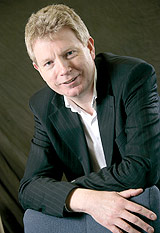 |
Professor
Mike Chantler
Digital Tools
M.J.Chantler@hw.ac.uk
Area of Research
- Surface texture analysis and visualisation.
Professor Chantler received his B.Sc.(First
Class) in Electrical and Electronic Engineering
from Glasgow University in 1979. On graduating
he spent seven years gaining experience in the
software engineering industry during which time
he setup Mandl Ltd to provide computer graphics
expertise in the Netherlands. In 1987 he returned
to Scotland and took up a position as a Lecturer
at Heriot-Watt where he led several EPSRC projects
on underwater imaging. One of these projects
exploited image texture for interpreting real
underwater scenes and this sparked what has
been his main research interest over the last
twenty years. In 1994 he gained his PhD which
developed novel theory on the behaviour of image
texture under changing environmental conditions.
This laid the ground work for a significant
collaboration with Professor Maria Petrou, Surrey
(now Imperial) which used photometric stereo
for the capture and analysis of surface texture
and spawned a series of international workshops
on the synthesis and analysis of texture (2002
Copenhagen, 2003 Niece, 2005 Beijing). In 2006
he chaired the seventeenth British Machine Vision
Conference in Edinburgh which was one of the
most successful, attracting over 450 submissions
from around the world. He has chaired two other
conferences, has served on numerous programme
committees and produced over 120 peer reviewed
papers. He is a director of the British Machine
Vision Association and a director of the spinout
Totallytextures Ltd.
Over the last ten years Professor Chantler
has directed the Texture laboratory at Heriot-Watt.
This lab which started from a strong basis
in the signal processing has gradually changed
its focus to include the quantitative analysis
of human perception of texture. It is probably
unique in the world in terms of its cross-disciplinary
expertise in surface texture.
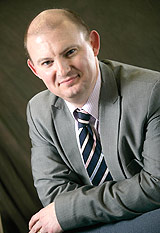 |
Professor
Marc Desmulliez
Microsystems for Manufacture Theme
M.Desmulliez@hw.ac.uk
Area of Research
- Micro-assembly and packaging - MEMS manufacturing.
Professor Desmulliez received his French Diploma
in Electrical Engineering from the Grande Ecole
SUPELEC (1987, Paris, France), top French School
in Electrical Engineering, MSc. in Microwave
and Modern Optics (University College London,
1987), Tripo III the Diploma in Theoretical
Physics (University of Cambridge, 1990) and
Ph.D. in Optoelectronics (Heriot-Watt University,
1995).
He worked as an Electrical Power Engineer at
SOLLAC in 1989 managing a group of 70 people,
in charge of the electrical maintenance of a
4000 strong steel factory in Dunkirk. As a Research
Associate in 1995, he conducted research into
various optoelectronic devices, including spatial
modulators based on MQW Fabry Perot effects
and nonlinear interference filters.
Since 1995, he has been Lecturer (1995-1999),
Senior Lecturer (1999-2001), Reader (2001-2006)
and Professor (2006-present) in the Department
of Electrical, Electronic and Computer Engineering.
He led this Department from August 2006 until
December 2009. In 1999, he created the Microsystems
Engineering Centre (MISEC), currently the 4th
largest UK research group in MEMS with over
30 Ph.D.’s and RA’s. MISEC specialisation
lies in the design, fabrication, packaging and
test of non-silicon based MEMS as well as the
study in advanced low-cost micro-manufacturing
technologies. He successfully spun out the Company
MicroStencil Ltd in January 2003 which is now
trading in Singapore as a joint venture with
DEK, the work leading equipment manufacturer
of stencil printer. Prof. Desmulliez has published
over 250 articles in his fields of research.
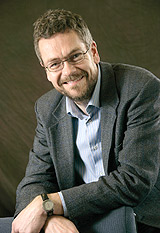 |
Professor
Duncan Hand FInstP
Photonics-based Manufacturing Theme
D.P.Hand@hw.ac.uk
Area of Research
- Laser optical sensing applied to laser material
processing, high power laser beam delivery applied
to laser material processing, laser material
processing.
Professor Hand graduated from the University
of St Andrews in 1986 with a BSc in Physics
with Electronics, and from the University of
Southampton (Optical Fibre Group) in 1991 with
a PhD. The PhD studies were centred around an
investigation of different techniques to incorporate
permanent phase gratings into optical fibres
(‘fibre bragg gratings’).
In 1991 he moved to Heriot-Watt University,
initially employed as a Research Associate to
work on optical fibre interferometric sensors
for automated cutting tool wear monitoring,
and subsequently on a large collaborative research
programme entitled ‘Laser Engineering
for Manufacturing Applications’ (LEMA),
in which he expanded his research interest into
applications of high power lasers in manufacturing
and sensing, and in the delivery of high power
laser light through novel optical fibres.
In 1997 he was appointed Lecturer in Physics
and subsequently promoted to Reader (2001) and
Professor of Applied Photonics (2003). He was
successful in obtaining funding for the Photonics
EngD Centre in 2001, and was Director of this
Centre until the end of 2007. His work on manufacturing
includes laser precision machining; the use
of adaptive optics in laser manufacturing processes;
and laser joining of microsystems, In this work
he collaborates with a range of companies including
GE Aviation, QinetiQ, Renishaw and Selex. Work
on high peak power delivery through novel fibres
includes a collaboration with the University
of Bath on photonic bandgap fibres, and with
the University of Nottingham on IR transmitting
fibres. Applications are in laser-based manufacturing
processes. Current sensing activity includes
photonic crystal fibre-based gas sensing, and
the embedding of fibre optic sensors into laser-based
rapid prototyping techniques.
He is currently the Academic Head of the Physics
Department within the School of Engineering
and Physical Sciences. His undergraduate teaching
interests include electromagnetism, optics,
and photonics.
He is currently a committee member of the Association
of Industrial Laser Users, and of the Institute
of Physics Scotland; he has been a member of
the EPSRC College since 1997; and he has presented
8 invited papers over the past 5 years. He has
recently been invited to join the Program Committee
of Laser-Based Micro- and Nano-Packaging and
Assembly 2010.
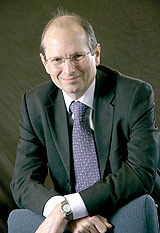 |
Professor
Julian Jones OBE FRSE FOSA FInstP
Deputy Principal of HWU (Strategy and Resources)
Photonics-based Manufacturing Theme
J.Jones@hw.ac.uk
Area of Research
- Optical sensing and instrumentation.
Professor Jones gained his BSc and PhD at the
University of Wales, Aberystwyth before becoming
a Lecturer at the University of Kent at Canterbury.
Since 1988, he has been at Heriot-Watt University,
Edinburgh, establishing a research group in
optical fibre sensors, optical instrumentation
and laser-material interactions; he has over
500 publications. In 1992 he became Professor
of Engineering Optics, in 1998 Head of Physics
and in 2002 Head of the School of Engineering
and Physical Sciences. In 2007, he became Deputy
Principal for Strategy and Resources. He is
a Director of OptoSci Ltd, a member of the Department
of Business, Innovation and Skills (BIS) Photonics
Leadership Group, Chair of the Institute of
Physics (IOP) Scottish Education Committee,
and a member of the Education Board and External
Affairs Board. In 2010, he was appointed to
the Scottish Science Advisory Council. He has
been a member of the Council of the Institute
of Physics, Chair of the Institute in Scotland,
President of the UK Consortium for Photonics
and Optics, a member of the Technical Opportunities
Panel of the EPSRC, and the RCUK Basic Technologies
Strategic Advisory Committee. He is a Fellow
of the Royal Society of Edinburgh, the Optical
Society of America and the Institute of Physics.
He was appointed as an Officer of the Order
of the British Empire in the New Year’s
Honours of 2002, ‘for services to science
and engineering’.
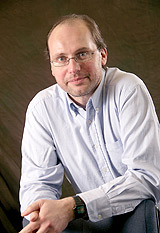 |
Professor
Andrew Moore
Photonics-based Manufacturing Theme
A.Moore@hw.ac.uk
Area of Research
- Optical metrology for laser materials processing.
Manufacturing processes involving thermally
induced stress.
Professor Moore received his BSc in Engineering
Science and PhD in Optical Metrology from Loughborough
University in 1988 and 1992 respectively. From
1992 to 1997 he worked at the Centro de Investigaciones
en Optica, Mexico. He joined Heriot-Watt University
in 1997 and is currently a Professor in the
Department of Mechanical Engineering.
He was an EPSRC Advanced Research Fellow (October
2000 to September 2005) which was assessed as
‘Outstanding’ (the top rating) in
its EPSRC grant review. He is currently a William
Penney Fellow of the Atomic Weapons Establishment
(August 2006 to March 2011). His research interests
include dynamic, full-field optical instrumentation
and its application to engineering measurement,
fringe pattern analysis and thermal forming.
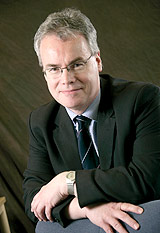 |
Professor
Jim Ritchie
Digital Tools
J.M.Ritchie@hw.ac.uk
Area of Research
- VR & CAPP, assembly planning, design and
manufacturing systems. Geometric reasoning,
manufacture planning, mass customisation.
Professor Ritchie received his BSc (Honours)
in Mechanical Engineering (CNAA) from, the then,
Dundee College of Technology, where he completed
5-years of sponsored industrial training, and
an MSc from Heriot-Watt University whilst working
as a Teaching Company Associate with Ferranti
Ltd. He is a Chartered Engineer with substantial
industrial and engineering management experience
in both design and manufacturing. He has also
been involved extensively in TEMPUS, EU, EPSRC
and KTP projects. His research work has been
inspired by the fundamental issues he addressed
and experienced as a practising engineer and
this has led to novel work using digital tools,
particularly 3D virtual environments, in the
areas of assembly, engineering design analysis
and knowledge and information capture. Other
areas of research involvement have included
capability maturity modelling of the engineering
design process, quality methods in the food
industry, laser cutting, austenitic manganese
steel machining, digital tools for logistics
management and rapid prototyping methods. All
of this work has attracted substantial industrial
input from a number of major engineering companies
such as SELEX, JCB, BAE SYSTEMS, Rolls-Royce
as well as other academic partners such as the
Italian Institute of Technology, University
of Bath IdMRC, University of Brasov (Romania),
CRIIF (Paris). He has over 140 journal and conference
publications, has presented the results of the
IMRC’s work at a large number of international
institutions and conferences and is regularly
invited onto Scientific Committees associated
with virtual reality applications in engineering.
He is currently Academic Head of Mechanical
Engineering in the School Of Engineering and
Physical Sciences.
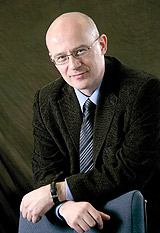 |
Management
Group Administrator
David Nisbet
D.J.Nisbet@hw.ac.uk
Mr Nisbet is Management Group Administrator to the Heriot-Watt
IMRC, (HW-IMRC), and the
School of Engineering and Physical Sciences.
As HW-IMRC administrator he is responsible for
co-ordinating and managing key activities of the centre. The role includes responsibility for organising the annual review process, co-ordinating the project approval process
and organising events such as its annual conference. He
undertakes a similar role for the newly formed James Watt Institute.
As Management Group Administrator he represents
his School at University level as
He supports the delivery of the Schools research strategy through undertaking activities such as the production
and analysis of performance and benchmarking data and through undertaking research to inform policy development on issues such as REF.
In 2006 he was awarded a Robbie Ewen Fellowship
which he used to fund a study visit to Harvard,
MIT and Boston Universities. After a series of interviews he produced a report on how to support
inter-disciplinary
academic research collaboration
He was previously the University Student Records
Officer with responsibility for managing the
The Heriot-Watt IMRC Principal Investigators serve
as the Management Group of the IMRC and as internal
members of the Steering Committee.